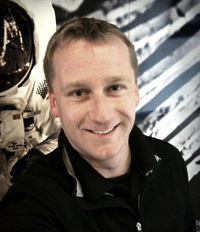TechLines panelist profile: NASA's Nicholas Skytland on big data literacy

Nicholas Skytland, program manager for NASA's Open Innovation Program, has trained astronauts for space walks in a pool the size of a football field on mock space stations, helped plot moon missions and works on open government and big data use.

That's quite a career roundup. Skytland (right) will be joining us Oct. 4 on our TechLines panel looking at big data, the analytics that go with it and the implications for business. Here's Skytland's thesis on big data:
"Big data is the future of where IT is going and one of the larger unsolved challenges. It's a complex challenge that requires you to capture information, store it and then figure out how to analyze and visualize it."
Luckily, there's a payoff. "The people that figure it out first will find a gold mine in the future," he said.
According to Skytland, big data knowledge will become a language every business and employee will need to know. "At a certain level people will have to become data literate and understand discussions around big data," said Skytland. "Data will consume many parts of our life and more people need to understand it---cashiers, scientists and salespeople."
Also: TechLines panel Oct. 4: Finding the big data signals
Skytland said he the big data movement today is akin to the initial Web wave. In the late 1990s and 2000s, Web developers had to know HTML, Ajax and CSS to build Web sites. Over time, those tools became easy and designers could swoop in and make the Web beautiful.
Big data is in that 1990s-2000s stage if you compare it to the Web. "With big data we're still figuring out tools and understanding the pipes," he said. "We're a long way from making big data beautiful and accessible."
At NASA, the big data question is front and center. Each mission is run by a skunkworks team that manages its own data. Ultimately, NASA has to connect those silos and the data. Skytland noted that NASA collects 10TB of data per day just on robotic space missions. "There's so much data to manage and how do we do that in a way that makes the most sense?" asked Skytland. "It's pretty fragmented and we're trying to figure it out and then analyze it."